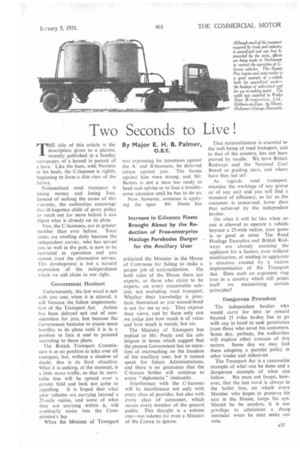Two Seconds to Live !
Page 55

If you've noticed an error in this article please click here to report it so we can fix it.
By Major E. H. B. Palmer, O.B.E.
THE title of this article is the description given to a picture, recently published in a Sunday newspaper, of a hound in pursuit of a hare. Like the hare, with Nemesis at his heels, the C-licensee is rightly beginning to form a dim view of the future.
Nationalized road transport is losing money and losing face. Instead of seeking the cause of this calamity, the authorities encourage this ill-begotten child of party policy to reach out for more before it can digest what is already on its plate.
You, the C-licensees, are in greater number than ever before. Your ranks are swelling daily because the independent carrier, who has served you so well in the past, is now to be restricted in operation and you cannot trust the alternative service. This development is but a natural expression of the independence which we still claim As our right.
Government Hesitant Unfortunately, the last word is not with you and, when it is uttered, it will forecast the fullest implementation of the Transport Act. .Action has been delayed not out of consideration for you, but because the Government hesitates to create more hostility to its plans until it is in a position to face it and to proceed according to those plans.
The British Transport Commission is in no position to take over all transport, but, without a shadow of doubt, this is its final objective. What it is seeking, at the moment, is a little more traffic, so that its inevitable loss will be spread over a greater field and look not quite so appalling It is hoped that what your vehicles are carrying beyond a 25-mile radius, and some of what they are carrying within it, will eventita:ly come into the Commission's lap
When the Minister of Transport was expressing his intentions against the A. and B-licensees, he deferred action against you. The forces against him were strong, and Mr. Barnes is not a man too ready to heed rash advice or to face a troublesome situation until he has to do so.
Now, however, someone is applying the spur. Mr. Poole has criticized the Minister in the House of Commons for failing to make a proper job of nationalization. On both sides of the House there are experts, or those who claim to be experts, on every conceivable subject, not excluding road transport. Whether their knowledge is practical. theoretical or just second-hand is not for Inc to say. They express their views, and by them only can . we judge just how much is of value and how much is merely hot air.
The Ministry of Transport has replied to Mr. Poole and his colleagues in terms which suggest that the present Government has no intention of encroaching on the freedom of the ancillary user, but it cannot speak for future Administrations, and there is no guarantee that the C-licence holder will continue to enjoy "diplomatic" immunity.
Interference with the C-licensee will be interference not only with every class of provider, but also with every class of consumer, which means every member of the general public This thought is a solemn one—too solemn for even a Minister of the Crown to ignore.
That nationalization is essential to the well-being of road transport, and to that of the country, has not been proved by results. We have British Railways and the National Coal Board as guiding stars, and where have they led us?
As I egards road transport, examine the workings of any group or of any unit and you will find a standard of efficiency, so far as the customer is concerned, lower than that achieved by the independent. haulier.
On what it will be. like when no one is allowed to operate a vehicle beyond a 25-mile radius, your guess is as good as mine. The Road Haulage Executive and British Railways are already accusing the applicant for a licence, even without modification, of wishing to aggravate a situation created by a vicious implementation of the Transport Act. Does such an argument ring true in a count' y which still prides itself on maintaining certain principles?
Dangerous Precedent The independent haulier who would carry for hire or reward beyond 25 miles to-day has to go with cap in hand to seek permission from those who covet his customers. Some day, perhaps, the authorities will explore other avenues of this nature. Some day we may find them adopting a parallel policy in other trades and industries.
The Transport Act is a reasonable example of what can be done and a dangerous example of what can follow. We must not forget, however, that the last word is always in the ballot box, . on which every Member who hopes to preserve his seat in the House, keeps his eye. Should he be careless, it is our privilege to administer a sharp reminder when he next seeks our vote.




















































































